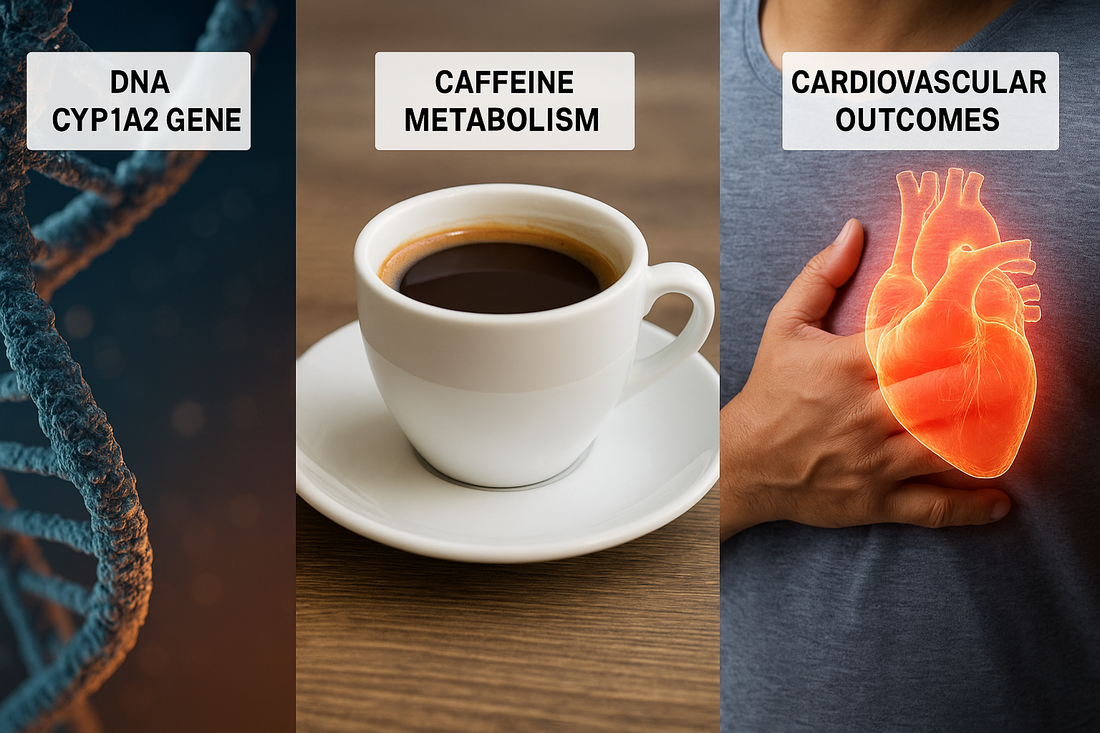CYP1A2 Gene Variants and Their Role in Cardiovascular Disease
Introduction
The CYP1A2 gene, located on chromosome 15q24.1, encodes a member of the cytochrome P450 superfamily of enzymes. CYP1A2 is primarily involved in the metabolism of caffeine, hormones, and various medications.
CardiaX testing includes CYP1A2 because its genetic variants influence caffeine clearance, blood pressure regulation, vascular inflammation, and cardiovascular disease (CVD) risk.
CYP1A2 Function in the Body
-
Caffeine metabolism: CYP1A2 is responsible for ~95% of caffeine clearance.
-
Hormone metabolism: Processes estrogen and other sex hormones, impacting clotting and vascular tone.
-
Detoxification: Helps metabolize polycyclic aromatic hydrocarbons from smoking and environmental toxins.
-
Drug metabolism: Influences efficacy and safety of common medications, including clopidogrel and some antidepressants.
CYP1A2 Variants and Their Impact
rs762551 (C→A polymorphism)
-
AA genotype (“fast metabolizers”):
-
Rapid caffeine clearance.
-
Lower risk of caffeine-induced hypertension and MI.
-
May have protective effects when consuming moderate coffee.
-
-
AC genotype (“intermediate metabolizers”):
-
Moderate caffeine metabolism.
-
Risk influenced by lifestyle and environmental exposures.
-
-
CC genotype (“slow metabolizers”):
-
Slower caffeine clearance.
-
Higher risk of hypertension, arrhythmia, and MI with high caffeine intake.
-
CYP1A2 and Cardiovascular Disease
-
Hypertension:
-
Slow metabolizers (CC) experience prolonged caffeine-induced vasoconstriction → higher BP.
-
-
Myocardial infarction (MI):
-
Coffee increases MI risk in slow metabolizers, but reduces risk in fast metabolizers.
-
-
Stroke:
-
High caffeine load in slow metabolizers increases clotting and ischemic stroke risk.
-
-
Drug interactions:
-
Poor CYP1A2 function alters responses to anticoagulants, antidepressants, and antiplatelet drugs.
-
What Worsens Risk in CYP1A2 Variants?
-
High caffeine intake: Especially dangerous in slow metabolizers.
-
Smoking: Induces CYP1A2 activity but also adds oxidative burden.
-
Estrogen therapy (oral contraceptives, HRT): Inhibits CYP1A2, further slowing caffeine clearance.
-
Environmental toxins: Compete for CYP1A2 activity, reducing detox efficiency.
How to Mitigate CYP1A2-Associated Risk
1. Lifestyle Strategies
-
Fast metabolizers (AA): Moderate coffee (2–3 cups/day) may lower CVD risk.
-
Slow metabolizers (CC): Limit caffeine to <100 mg/day (about 1 small coffee or avoid entirely).
-
All carriers:
-
Avoid smoking to reduce toxin load.
-
Choose organic foods to limit exposure to pesticides and polyaromatic hydrocarbons.
-
Regular exercise to lower BP and improve vascular health.
-
2. Nutraceuticals
-
Omega 1300 — Omega 1300: Reduces inflammation and supports vascular function.
-
CoQ10 Omega — CoQ10 Omega: Protects endothelial cells from oxidative damage.
-
Curcumin Complex — Curcumin Complex: Anti-inflammatory, supports detox pathways.
-
Magnesium glycinate: Supports vascular relaxation and lowers BP.
-
N-acetylcysteine (NAC): Enhances detoxification and glutathione synthesis.
3. Peptide Therapies
-
BPC-157: Heals vascular and gastric lining from oxidative stress.
-
MOTS-c: Improves mitochondrial function and cardiometabolic resilience.
-
KPV: Potent anti-inflammatory for vascular protection.
4. Medications
-
Antihypertensives: For CC carriers with caffeine-induced hypertension.
-
Antiplatelet therapy (clopidogrel): Metabolism partly dependent on CYP1A2; dosing may need adjustment.
-
Antidepressants and antipsychotics: Clinicians should adjust based on CYP1A2 status for optimal effect.
Case Example
A 45-year-old woman with CYP1A2 CC genotype (slow metabolizer) presented with palpitations and hypertension after drinking 3 cups of coffee daily.
Plan:
-
Lifestyle: Reduce caffeine intake to decaf, increase exercise.
-
Supplements: Omega 1300, CoQ10 Omega, NAC.
-
Peptides: MOTS-c prescribed for metabolic resilience.
-
Medications: Began low-dose antihypertensive for BP stabilization.
Outcome: Palpitations resolved, BP dropped from 150/92 to 126/80 within 3 months.
The Bottom Line
The CYP1A2 polymorphism plays a major role in caffeine metabolism, cardiovascular health, and drug response.
-
AA carriers (fast): Benefit from moderate caffeine.
-
CC carriers (slow): Higher CVD risk with caffeine—avoid or minimize intake.
-
AC carriers: Intermediate, lifestyle-dependent risk.
With CardiaX results, patients and clinicians can make personalized decisions around caffeine, supplements, peptides, and medications to reduce cardiovascular risk.
References
-
Cornelis MC, et al. Coffee, CYP1A2 genotype, and risk of myocardial infarction. JAMA. 2006.
-
Palatini P, et al. CYP1A2 genotype modifies association between coffee intake and risk of hypertension. Hypertension. 2009.
-
Sachse C, et al. Functional significance of a C→A polymorphism in CYP1A2. Pharmacogenetics. 1999.
-
Kot M, Daniel WA. Caffeine as a marker substrate for testing cytochrome P450 activity in humans. Pharmacol Rep. 2008.


